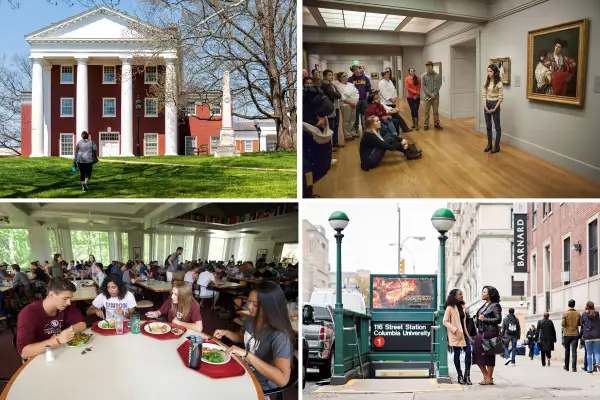These Are the 10 Best Liberal Arts Colleges for Your Money

Going to college doesn't have to mean spending four years in giant lecture halls with professors who don't know your name. You can still get a big-fish-in-a-little-pond type of experience at a liberal arts college.
And before you start worrying about becoming a starving artist, take note: Studies show there are high-paying jobs available to liberal arts grads, especially given that employers say they're looking for communication skills and the ability to work in a team. Liberal arts grads also report being just as satisfied with their careers as their STEM-studying peers.
To help you find a college where you can delve into the humanities and still have a strong chance of graduating into a good job, Money built a list of the country's top liberal arts colleges.
To do so, we started with institutions the Carnegie Classification of Institutions of Higher Education defined to be baccalaureate colleges with an arts and science focus in 2018. In order to be included, at least half of all degrees awarded at a college had to be bachelor's degrees (and fewer than 50 had to be master's degrees). At least half of the bachelor's degrees had to be in arts and sciences fields.
Next, we ranked the schools based on where they fell in Money's annual Best Colleges rankings, which measures colleges by their affordability, quality and career outcomes.
Here are the results. Check out the top 10 liberal arts colleges in the country below, and then see our full ranking of 50 here.
1. Washington and Lee University
Overall Money rank: 24
Washington and Lee's 1,800 undergraduate students will find liberal arts courses aplenty at The College, which offers 37 majors in art history, English, philosophy, mathematics, and medieval and Renaissance studies. The College promises to create an environment where students will "sharpen their critical thinking skills" and "develop their capacities for clear communication and creative expression."
2. Williams College
Overall Money rank: 36
Williams doesn't have any required courses for its 2,000 undergraduates, but people flock to majors like economics, biology, psychology, history and political science. The student-faculty ratio is 7:1 on the Williams campus, which is about a three-hour drive from both Boston and New York City.
3. College of the Holy Cross (tie)
Overall Money rank: 42
At Holy Cross, a liberal arts education includes "essential foundational skills" like critical thinking and analysis. To that end, the school's roughly 3,000 undergraduates can check out academic programs in Asian studies, French, studio art and theater.
3. Swarthmore College (tie)
Overall Money rank: 42
Swarthmore says its liberal arts options are "the perfect education for the intellectually curious." Students devote two years to exploring the humanities and sciences, and then they zero in on a major for their final two years. May we suggest dance, Islamic studies or any of the other roughly 50 academic programs in between?
5. Bates College
Overall Money rank: 52
Bates has spent more than 150 years "dedicated to the emancipating potential of the liberal arts." Freshmen start out by learning liberal arts basics at residential colleges and end as seniors turning in a capstone project. Majors and minors include neuroscience, Japanese, and gender and sexuality studies — just take your pick.
6. Union College
Overall Money rank: 53
Union likes to say it's "been defining — and redefining — the meaning of a liberal arts education" since the 1700s. Check out programs in astrophysics, nanotechnology, Russian and managerial economics. With a 10:1 student-faculty ratio, the college is especially proud of the individual attention it gives each student.
7. Barnard College
Overall Money rank: 54
Barnard offers its students over 2,000 classes on topics like the politics of crime and policing in the U.S., Shakespeare and quantum physics. A liberal arts education here is intended to enable women "to make connections and take risks," and they're in a great place for it: New York City.
8. Colgate University
Overall Money rank: 55
Colgate's 3,000 students "are taught to think critically, communicate powerfully, analyze other perspectives, and solve complex problems." They have their pick of 56 majors, which include anthropology, Greek, and peace and conflict studies. Plus, when not in class, people can walk around the school's gorgeous hillside campus.
9. Virginia Military Institute
Overall Money rank: 63
Though it may not sound like one, VMI is recognized as a liberal arts college because its curriculum is designed to give its 1,700 cadets broad exposure to the liberal arts. Cadets take courses in subjects like modern languages, international studies and computer science alongside ROTC. There's a tight-knit community on campus — some classes only have 11 people in them — and the student body is mostly male.
10. Amherst College
Overall Money rank: 70
Amherst promotes its liberal arts education as a chance to develop "potential for understanding possibilities, perceiving consequences, creating novel connections and making life-altering choices." Most classes have fewer than 30 students in them, but everyone can choose from a wide variety of courses in subjects like classics, religion and Spanish.
